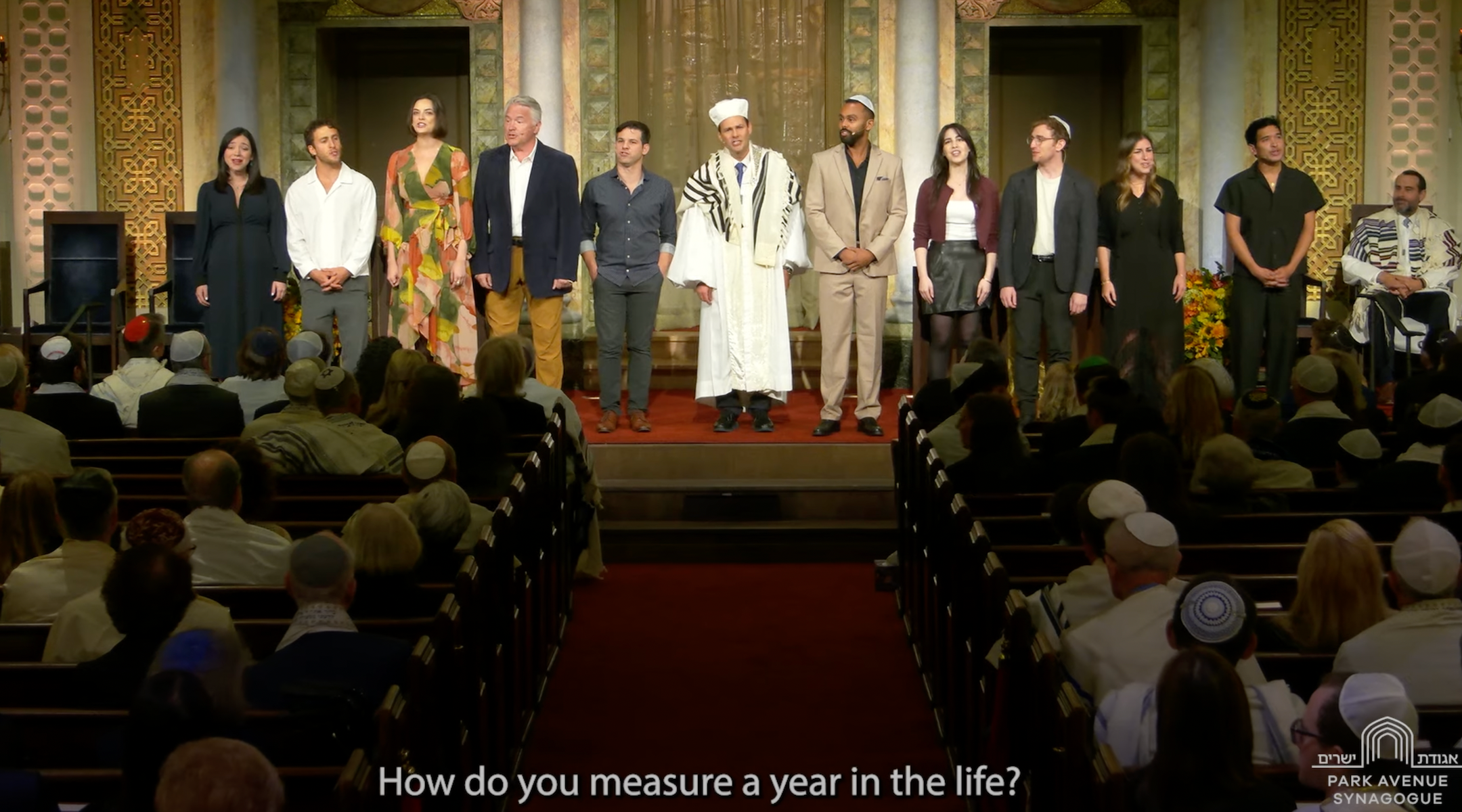Park Avenue Synagogue introduced a new practice during Rosh Hashanah to mark the end of a Jewish year that included the Hamas attacks of Oct. 7 and the war and turmoil that has followed: A cohort of Broadway performers sang “Seasons of Love” from the popular rock musical “Rent” on the bimah.
The performance took place during services on Thursday, Oct. 3, the first day of Rosh Hashanah.
According to Cantor Azi Schwartz, it was the first time Park Avenue Synagogue hosted Broadway performers on the bimah during High Holidays. He told the New York Jewish Week that he wanted to tell the congregation that “Broadway can be your home, the sanctuary at Park Avenue can be your home and Judaism is your home — and they all exist together.”
“Our year has been filled with sorrow and strife. How can we celebrate? How can we kvetch, knowing the pain of the hour? Our response, authentically, is by way of love, seasons of the love,” said the congregation’s senior rabbi, Elliot Cosgrove, introducing the performers as they began singing from the back of the room, making their way to the bimah.
The performers included Julie Benko, who broke out in 2022 as a standby for the role of Fanny Brice in “Funny Girl” and more recently played a Jewish radical in Barry Manilow’s Nazi-era musical “Harmony”; Talia Suskauer, who was recently cast as the wife of Jewish lynching victim Leo Frank in the national tour of “Parade,” and Etai Benson, who starred in a revival of Stephen Sondheim’s “Company.” The other performers were Nathan Salstone, Bob McDonald, Jesse Nager, Jenny Rose Baker, Danny Kornfeld, Lindsay Lavin and Zachary Piser.
“It was quite fitting to choose the song ‘Seasons of Love’ to think about the message for this year’s High Holidays,” Schwartz told the New York Jewish Week. “We wanted to give people hope and something fun and something that is familiar to start to bridge the world that has been so shattered for them.”
The cantor worked with Broadway producers Amanda Lipitz and Henry Tisch for several months to put together the arrangement of the popular song, written for the hit 1996 Broadway musical that chronicled the lives of bohemian East Villagers in the 1980s who were living beneath the shadow of the AIDS crisis.
Composed and written by Jewish playwright Jonathan Larson — who died of a heart disorder before he got to see the success of “Rent” — the song’s lyrics count up the total minutes of a year — 525,600 minutes, to be exact — or “in daylights, in sunsets, in midnights, in cups of coffee,” before concluding that the most effective way is to “measure in love.”
Lipitz said she’s long felt the song meaningfully marks the passing of a year and the anticipation for a new season — themes relevant both for the Jewish new year as well as the one-year anniversary of Oct. 7.
“I’ve always felt that ‘Seasons of Love’ was such a perfect Jewish song, especially for Rosh Hashanah,” Lipitz, who is also a member of Park Avenue Synagogue, told the New York Jewish Week.
Schwartz added that the impetus to perform a Broadway tune during the service was to reach out to Jews who “may seek comfort beyond the traditional prayers.”
“It’s important to know that it’s not ‘instead of,’ it’s ‘in addition to,’” Schwartz said. “I personally see the prayer book as a living and breathing document, like a Jewish passport. In every generation, we add prayers, we edit things, we create new prayers and new tunes, we treasure the traditional ones, and we adapt to our time. To me, the Broadway repertoire can absolutely be adopted, not just as a joke for ‘Adon Olam,’ which we do from time to time, but actually to contribute some new lyrics, texts and melodies. As long as it fits into the emotions that we try to accomplish in our prayers, then I think it’s kosher.”
Earlier this year, Lipitz and Tisch produced “Shabbat on Broadway” at the St. James Theater, billed as “a non-denominational Shabbat service with a real Broadway twist,” which drew a crowd of nearly 2,000.
“Being a part of the Broadway community and meeting more people in my own community that I didn’t know before because of this is such a beautiful thing,” Lipitz said of Thursday’s performance. “It’s the only way to counteract all of this pain.”
She added, “If somebody walked away from ‘Seasons of Love,’ or if someone watches it online in whatever country they’re in, and what they take away is to spread that love, from a Jewish perspective, then we’ve accomplished something.”
The New York Jewish Week brings you the stories behind the headlines, keeping you connected to Jewish life in New York. Help sustain the reporting you trust by donating today.





